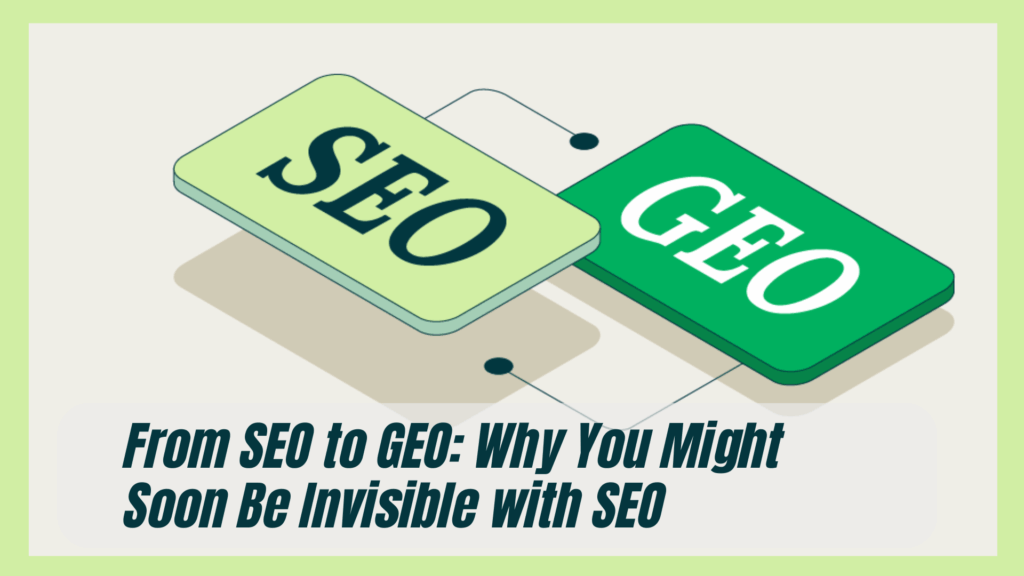Shift from Traditional SEO to AI‑First Discovery is paramount because the ground under search is moving. Users no longer rely on “ten blue links”; they increasingly ask AI assistants for direct answers in a conversational interface. Tools such as ChatGPT, Google’s AI Mode, Bing Copilot, Perplexity, Claude, Grok, Deepseek, and others synthesize answers from multiple sources and often satisfy intent without a click. That “answer‑first” behavior explains the drop in click‑through rates and the rise of “zero‑click” outcomes: even a #1 ranking can be unseen if an AI summary answers the query upfront.
This shift is not the end of SEO; it is SEO’s evolution from ranking to referencing. The practical goal changes from “get position X for keyword Y” to “be selected and cited inside AI answers.” Success now depends on whether LLMs recognize your brand as a reliable, up‑to‑date authority that is easy to parse, summarize, and attribute.
This executive playbook summarizes the transformation, the strategy to win, the stack to execute, cost ranges, and examples of companies that already benefit from AI‑first discovery. It concludes with what matters most: upskilling your team’s human strengths to partner with AI rather than chase it.
Understanding the Shift from SEO to AI
What changed, exactly? Traditional SEO optimized for algorithmic ranking signals: keywords, links, and technical health, so that users would click into your site from a SERP. AI‑first discovery flips the experience: LLMs read many sources, distill the relevant bits, and present a synthesized answer with a handful of citations. Visibility therefore moves inside the AI interface. Being “ranked” no longer guarantees being seen; being referenced does.
User behavior: Surveys show a fast‑growing share of users start with AI. Many, especially younger cohorts, say they trust ChatGPT’s explanations and discover brands through it because answers feel faster and more personalized. That re‑routes early‑funnel discovery from Google to AI, compressing the path from question → answer → action.
Platform behavior: Google’s AI Overviews/Mode, Bing Copilot and Perplexity surface answers compiled from multiple sources, frequently reducing clicks to individual sites. Models prefer authoritative, consistent, well‑structured sources that are easy to quote cleanly.
Implication: Your strategy must ensure that (1) your best facts are available and consistent across the web, (2) your content is structured for extraction (chunkable, schema‑rich, question‑answer formatted), and (3) your brand earns authority signals beyond your own site, so AIs feel confident citing you.
Strategy to Succeed in the SEO-AI Shift
Below is a pragmatic, repeatable strategy that solopreneurs, SMBs, and startups can execute without boiling the ocean. Think of it as moving from “keyword pages” to an AI‑native information system.
1) Reinforce the foundation: Keep technical SEO excellent (fast pages, mobile‑first, crawlability, core web vitals), implement HTTPS, fix duplication, and maintain clean information architecture. These are shared trust signals for both search engines and AI systems.
2) Make content AI‑extractable: Write for questions and entities, not just keywords. Use skimmable structure (H2/H3, bullets, tables), concise TL;DRs, and explicit FAQ/Q&A blocks. Add schema (FAQ, How‑To, Product, Article, Organization, Review) in JSON‑LD to clarify meaning. Favor chunk-able sections that stand alone when quoted. Treat each page as a set of “Lego bricks” an AI can safely lift.
3) Publish depth, proof, and freshness. AI prefers comprehensive, current sources. Add original research, data, step‑by‑steps, and examples, timestamp updates. Maintain a lightweight content refresh cadence on high‑intent assets so “last updated” stays recent. Tie claims to sources and numbers that AIs can verify.
4) Establish entity authority beyond your site. Pursue digital PR and expert mentions in respected outlets, niche publications, podcasts, and community forums such as Reddit, Stack Overflow, and industry groups. Ensure your brand facts, including people, products, prices, addresses, categories, are consistent across knowledge panels, directories, press releases, and anywhere they appear. Healthy review profiles and sentiment also influence whether an AI will recommend you.
5) Ship an `llms.txt` and advanced sitemaps. Consider an `llms.txt` file at your domain root to point AI crawlers to your best, “safe‑to‑quote” evergreen resources (it’s a treasure map, not a robots gate). Keep traditional XML sitemaps tidy; add news/video sitemaps if relevant.
6) Optimize for AI platforms directly. Test how ChatGPT, Perplexity, Bing Copilot and Gemini answer your core questions. Where you are not cited, ask: what entity is being quoted instead? What data or format do they provide that you don’t? Close those gaps with question‑first pages, structured facts, and supporting evidence.
7) Treat social & communities as AI inputs. Community Q&A, GitHub READMEs, YouTube transcripts, LinkedIn posts, Quora/Stack Overflow answers, and all can feed models or be indexed by AI‑search. Contribute authentically where your audience lives; seed answer‑grade snippets that AIs can surface and attribute. Repurpose long posts into short, quotable chunks.
8) Measurement: add AI visibility KPIs. In addition to rankings and organic sessions, start tracking: AI citations, AI referral traffic, conversion rate from AI referrals, and brand mention velocity. Use UTM parameters for AI links you control and segment AI referrals in GA4.
9) Conversion path for “answer‑referred” visitors. People who click out of an AI answer are often high‑intent. Match the promise of the answer with deep‑linking into the exact section, reinforce with a one‑screen summary, and provide a clear next action (demo, trial, price, calculator). Maintain message continuity from the citation to your page.
10) Governance and iteration. Create a monthly AI discovery review: top Q&A opportunities, content refreshes shipped, citations gained/lost, PR placements achieved, experiments run (e.g., adding a TL;DR block vs. not).

Tools to Execute the SEO-AI Shift
You don’t need a dozen subscriptions to start. Build a lean stack and add as you see return on investment (ROI). Categories and representative tools below or choose the equivalents you prefer:
Research & content planning: Frase, Surfer, Clearscope, MarketMuse for semantic and topic modeling and outlines. Use Chat AI models for brainstorming questions and counter‑arguments.
Technical & structure: Yoast/RankMath for schema; schema.org generators; site auditors (Screaming Frog, Semrush site audit). Add `llms.txt` via your CMS or server config.
Visibility & tracking: Ahrefs/Semrush as they are now adding AI visibility angles, HubSpot AI Search Grader, Peec.ai, Gushwork, plus GA4 referrer segments and UTM conventions.
Authoritativeness/PR & listening: Muck Rack/PRNewswire for digital PR distribution when appropriate, Mention/LexisNexis/Brandwatch for monitoring citations and sentiment.
Creation & QA: Jasper/Copy.ai for first drafts, then human edit; Grammarly for tone and clarity; internal “red team” to fact‑check and align with E‑E‑A‑T. Keep a shared checklist for AI‑extractability.
Successful Case Studies
Viv (period‑care brand) wins on depth. Viv invested in granular, evidence‑backed content on sustainability and ingredients. When users asked AI which products were toxin‑free, ChatGPT frequently cited Viv, driving a 400% traffic bump from AI and a 436% lift in sales from those visitors.
Small e‑commerce surprise (Joe & Bella). The adaptive‑apparel startup noticed holiday sales surging from ChatGPT referrals even before they optimized deliberately. They then pivoted to strengthen product facts and Q&A content so AI would keep recommending them.
PR as an AI input (“press‑release method”). A services company became ChatGPT’s #1 suggestion for its niche after a targeted press release seeded authoritative sources that models ingest. This worked on top of solid SEO, proving that where you publish facts can influence AI selection.
Costs of the Shift
Budgets vary with scope, but patterns are emerging across small teams, SMBs, and growth startups:
Tools’ Cost: entry‑level SEO/AI tools can start ≈ $50–$150/month each; consolidated suites (Semrush tiers) ≈ $129–$500/month; enterprise content intelligence stacks can range $10k–$100k+/yr depending on seats and features.
One‑time setup Cost: technical audit & fixes ($2k–$10k+), structured data implementation ($1.5k–$7k), AI visibility dashboarding ($500–$3k), content restructuring ($5k–$25k+) depending on volume.
Monthly operating Cost: content creation/refresh ($2k–$15k+), digital PR & authority building ($3k–$20k+), tool subscriptions ($300–$2k), monitoring/reporting ($1k–$5k).
Talent: hiring or upskilling AI‑aware content strategists, technical SEOs, and analysts (typical US salaries: ~$70k–$160k, role‑dependent). Small teams can blend contractors with internal owners to control cost.
ROI/intent quality: Early data shows AI‑referred visitors convert significantly higher than standard organic. For instance, ChatGPT traffic converting is converting at 16% vs 2% for Google organic in one study and engage more deeply based on more pages visited and session duration. That can justify increased spend even if raw volume is smaller.
Opportunity cost: Doing nothing risks losing visibility as AI answers siphon clicks. Early movers can capture 5–10% of organic from AI‑search in year one in some verticals, compounding as models and user habits mature.
Upskilling is Key for a Shift
The new discovery game is not about out‑automating your competitors. It’s about out‑answering them with clarity, credibility, and consistency. AI chooses sources that are trustworthy, structured, and genuinely helpful. That relies on human capabilities as much as tooling. Prioritize these human skills across your team:
Critical thinking & editorial judgment: Decide which claims deserve evidence, which angles matter, and how to avoid hallucinations or over‑claims. AI can draft; humans decide what’s true and useful.
Subject‑matter expertise: LLMs surface the best explained ideas. Pair domain experts with writers so your content carries real‑world detail, examples, and constraints that AI favors when choosing citations.
Prompting & decomposition: Use AI to accelerate research, not replace it. Good prompts produce better outlines, counter‑points, and checklists. Decompose big topics into answerable sub‑questions that map to content blocks AIs can reuse.
Information design: Structure pages for extraction using clear headings, Q&A, TL; DRs, and tables. Keep facts consistent across channels, and maintain clean entity data of names, SKUs, prices, and locations. This is the craft of being quotable.
Community presence & credibility: Show up where your audience learns, namely industry groups, forums, meetups, podcasts. Earn mentions and reviews that models observe. Authority is a network effect you build over time.
Learning agility: AI platforms and policies evolve monthly. Institute a cadence of experiments: add schema to FAQs, ship `llms.txt`, refresh cornerstone explainers, test deep links from AI answers, compare conversion. Share wins/losses openly; iterate.
If you adopt the strategy above, your brand will be present inside the answers where buyers now make decisions. That is the essence of shifting from traditional SEO to AI‑first discovery: earning the right to be the cited source when it matters most.
References
Adobe — ChatGPT as a Search Engine (2025). https://www.adobe.com/express/learn/blog/chatgpt-as-a-search-engine
MarketDesign Co. — AI‑First SEO: Why Brands Must Shift from Search to Discovery (2025). https://www.marketdesignco.com/blog/ai-first-seo
Search Engine Land — llms.txt isn’t robots.txt (2025) and “Keep SEO skills sharp in an AI‑first world” (2025). https://searchengineland.com
Xponent21 — From SEO to AEO: Surviving the AI Search Shift (2025). https://xponent21.com/insights/seo-aeo-surviving-ai-search-shift/
Seer Interactive — Case Study: How traffic from ChatGPT converts (2025). https://www.seerinteractive.com/insights/case-study-6-learnings-about-how-traffic-from-chatgpt-converts
Diggity Marketing/The Search Initiative — AI Overviews SEO Case Study (2025). https://diggitymarketing.com/ai-overviews-seo-case-study/
RetailWire — ChatGPT driving traffic to retailers/brands (2025). https://retailwire.com
MarketersMedia — Case Study: Proven ways to rank on ChatGPT/Perplexity/Gemini. https://marketersmedia.com/rank-on-ai-search




